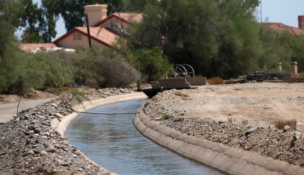Bill to ban public lobbyists hits snag in Senate
Arizona Capitol Reports Staff//February 8, 2008//[read_meter]
Bill to ban public lobbyists hits snag in Senate
Arizona Capitol Reports Staff//February 8, 2008//[read_meter]
A proposal aimed at banning public spending on lobbyists faces an uphill struggle at the Capitol.
A Senate panel tackled the proposal on Feb. 4, but voting on it was held on the recommendation of the bill’s sponsor, who is mulling a possible amendment.
“My sense is that the lobbyists are still in control and that the bill will not go forward,” Sen. Linda Gray of Glendale, author of SCR1009, said a day after the hearing.
Sen. Jack Harper, R-4, chair of the Senate Government Committee, said the bill’s supporters would have to “accept something less than they ideologically wanted” if they want to see the bill through.
One panel member, Sen. Robert Blendu, R-12, said he wouldn’t have voted for the measure.
“We have a scenario where agencies hire lobbyists just to make their agency bigger,” he said.
The problem: “There is no check and balance against that without doing damage to the small cities in rural Arizona that say ‘we all have a similar issue, neither one of us has enough money by ourselves, let’s band together and hire a guy to go to the capital and tell our story,’” he said. “The problem is like all the bills that we do, when you get one set of language down, it ends up binding the good guys and the bad guys always get around it.”
SCR1009 aims to refer to voters the question of whether to amend state laws to prohibit public officials, government employees, or contractors retained by a public body from lobbying in the Capitol.
It prohibits the use of public resources to lobby the Legislature. But under the legislation, a public officer acting in a private capacity and who is not getting compensation for his or her time can participate in the legislative process. Lawmakers also can call upon public officers to provide expert testimony.
Gray said she is working on an amendment but cannot find a “solution” that would strike a middle ground. She has not heard any suggestions from publicly paid lobbyists either, Gray said.
“The state of Arizona is lobbying itself,” the Goldwater Institute, a conservative think-tank, stated in a report released last year. The consequence is that government interests “become pitted against taxpayers’ interests,” according to the report.
The Institute reported that Arizona government bodies spent more than $10 million of taxpayers’ money on lobbying activities between 2000 and 2005. Government lobbyists outnumbered legislators by a ratio of 10-to-1, the Institute said.
Backers of the measure said it’s inequitable that money is being spent on public lobbyists who lobby for more money and argue on behalf of positions that might be contrary to what taxpayers want.
But some lawmakers expressed concern that the measure fails to consider the needs of government bodies, like cities and towns, located far from the capitol.
Sen. Jake Flake, R-5, said those in the outlying areas could be left out of the legislative process if they did not have the ability to band together and hire a lobbyist to speak for their interests.
And for the most part, that interest centers on keeping their revenue shares in place, Flake said.
“I see a problem with that money that goes out, but I don’t know if the way to do that is limit the voice of the people to the Legislature by taking away what I feel is a legitimate source — something that they can’t say for themselves because of distance, because of time restraints, because of money,” Flake said.
Kenneth Bond, a private citizen who testified in support of the measure, said government is supposed to be “neutral in any legislation.”
“And that’s what this bill is endeavoring to do – bring the agency back to a position of neutrality,” he said.
“If I disagree with their position, then what is happening is that they are using my resources to advocate for things that build the agency, and as the agency is supposed to be neutral, (then) that would not be a constitutional thing for them to do,” he said.
Bond also argued that Arizona’s Constitution is a “limiting document.” Unless specifically provided for in the Constitution, the government is not supposed to do it, and the document has “no provision for anyone to work in legislation, except the Legislature itself,” he said.
Doug Cole, a lobbyist for the League of Arizona Cities and Towns, argued from the standpoint of practicality. He said in many cases, councilmen and supervisors receive minimal salary and hold private jobs, making it difficult for them to follow proceedings and participate in the legislative process on a daily basis. ?
















